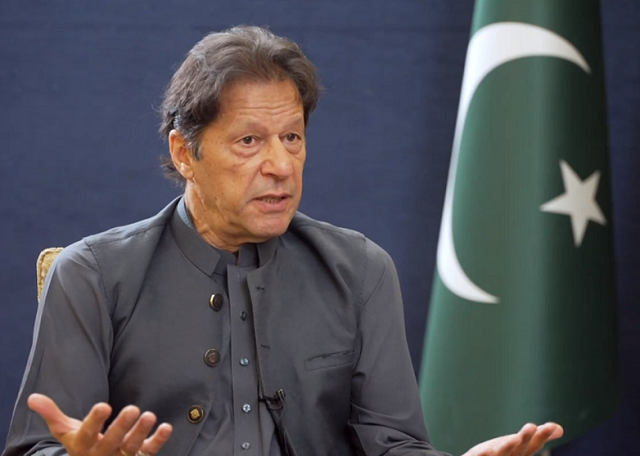Is PM writing his own ‘political obituary’?
Political observers say prime minister using sensitive foreign policy matters to advance partisan political interests

Facing louder calls for resignations with his government experiencing vertigos of potential collapse, the prime minister seemed to be inadvertently writing his own obituary – a political one.
Prime Minister Imran Khan’s impassioned address to the nation on Thursday appeared to many political observers as a desperate attempt to invoke sympathy by framing the political perils as a “foreign conspiracy,” a last attempt to tap into the sentiments of ordinary Pakistan to save the imploding rule.
When the Pakistan Tehreek-e-Insaf appeared on the political scene as a fresh voice in 2018, the agitation as well as cheers of the disenchanted against the “old Pakistan” around and preceding PM Khan’s government were welcomed as the birth pangs of 'Naya Pakistan'. The ‘insurrection’ against the order had itself dared to join the order to transform it.
But as the nation reeled from economic woes and issues governance, the government continued to dole out feel-good bromides and promises of 'tabdeeli - until it was too late.
Three years into the PTI’s rule, things came to head and the high hopes shattered, allowing the opposition to tap into the brewing discontent.
Political pundits and politicians claim that what should have been a reflective pause and effective soul-searching for PM Khan has become a moment of desperate attempts to stoke sensitive sentiments to save the government.
'PM linking personal gains with security'
“It is shocking that he has linked his own political survival with a sensitive issue of national security,” Pakistan Peoples Party (PPP) Senator Sherry Rehman shared.
Referring to the National Security Committee and Parliamentary Committee on National Security, Sherry said that all these committees should have met by March 8 or 9, and discussed all these issues thoroughly for a clear response from all parties as this was the way practised in all governments before.
Also read: No-confidence vote on Sunday, which will decide our nation's destiny: PM
Sherry, who served as Pakistan’s ambassador to the US, recalled that all crises were debated and unpacked with stakeholder input in the past; responses were linked to state resilience and not personal political survival. “This speech was a clear example of a highly personalized vision of an egocentric mind: one that is delusional to the point of embarrassment,” she said.
“Any threat or risk to the country is immediately responded to, not after the opposition has shown many more than 175 members for a vote of the no-confidence motion.”
President of the Pakistan Institute of Legislative Development and Transparency (PILDAT) Ahmed Bilal Mehboob also felt that “a sensitive foreign policy matter was being intentionally or unintentionally used for advancing partisan political interests”. The PILDAT president said that it was a simple issue; the message communicated to the country should have been replied to through the same channel instead of making it a subject of public discourse.
“I also don’t find it convincing that a message received on 7th March was responded to on 27th March and that too in a public meeting arranged to counter no-confidence motion,” Mehboob said.
“Why didn’t the government use these 20 days to adequately respond?” he asked, adding that it was wrong to suggest that vote of no confidence was the result of international conspiracy as the issue of bringing a no-confidence motion was being discussed for the last year.
Former premier Shahid Khaqan Abbasi said that, “He [PM] urgently needs a psychiatric examination; the results should be made public".
On the basis of the strength that the opposition parties showed in the National Assembly just before the premier’s address to the nation, Abbasi said that “The PM has lost all rationality and sanity,” adding, “the people of Pakistan will write his obituary.”
“Patriotism is the last refuge of the scoundrel,” Ex-minister for defence and foreign affairs Khurram Dastgir Khan quoted Samuel Johnson. Faced with imminent ouster due to the vote of no-confidence in Parliament, Khurram said, “Imran Khan was hiding beneath the mantle of Anti-Americanism.”
PM Imran’s political survival is the reason behind his torpedoing of Pak foreign relations by making public a diplomatic dispatch, Khurram said, adding one visit to Russia does not constitute an independent foreign policy; just as one diplomatic dispatch does not constituent a country’s foreign policy. Khurram said that it was PMLN that tried to balance Pakistan’s relations with the U.S through an unprecedented Defence Cooperation Agreement with Russia in 2014, China-Pakistan Economic Corridor (CPEC) with China in 2015, and taking full membership in the Shanghai Cooperation Organisation (SCO).
Also read: Pakistan lodges protest with US over ‘threatening memo’
Professor Tahir Malik said that except for the part where PM talked about foreign conspiracy, his speech was almost similar to previous speeches and there wasn’t any surprise in it. Seeing the writing on the wall, the professor at NUML University’s IR department said, PM has set the tone for his future course of action, saying nationalism, Islam and foreign policy were the main components of it. Knowing that the argument on the government’s performance would not be effective, Malik said, PM preferred to talk about foreign powers behind his ouster.
“What really matters is that the hope that he had given to people; the hope of building a new Pakistan; the hope of change could not be fulfilled,” Malik concluded.
The information minister was asked to share his comments on PM Imran’s speech but his reply didn’t come till the filing of the story.
It is learnt that PM Imran Khan was agreed to dissolve assembly in case joint opposition withdraws the no-confidence move against him. However, opposition leadership especially Asif Zardari did not accept this offer which was communicated through powerful circles.



















COMMENTS
Comments are moderated and generally will be posted if they are on-topic and not abusive.
For more information, please see our Comments FAQ